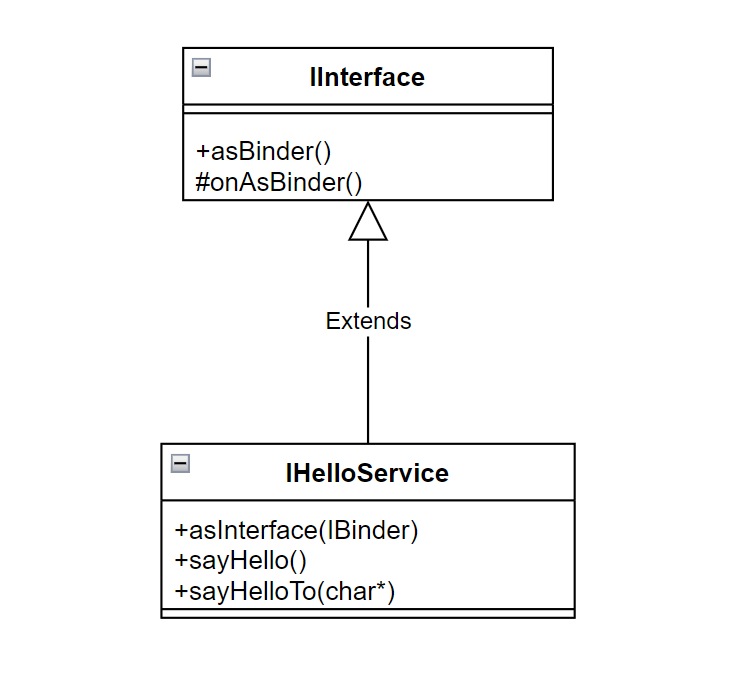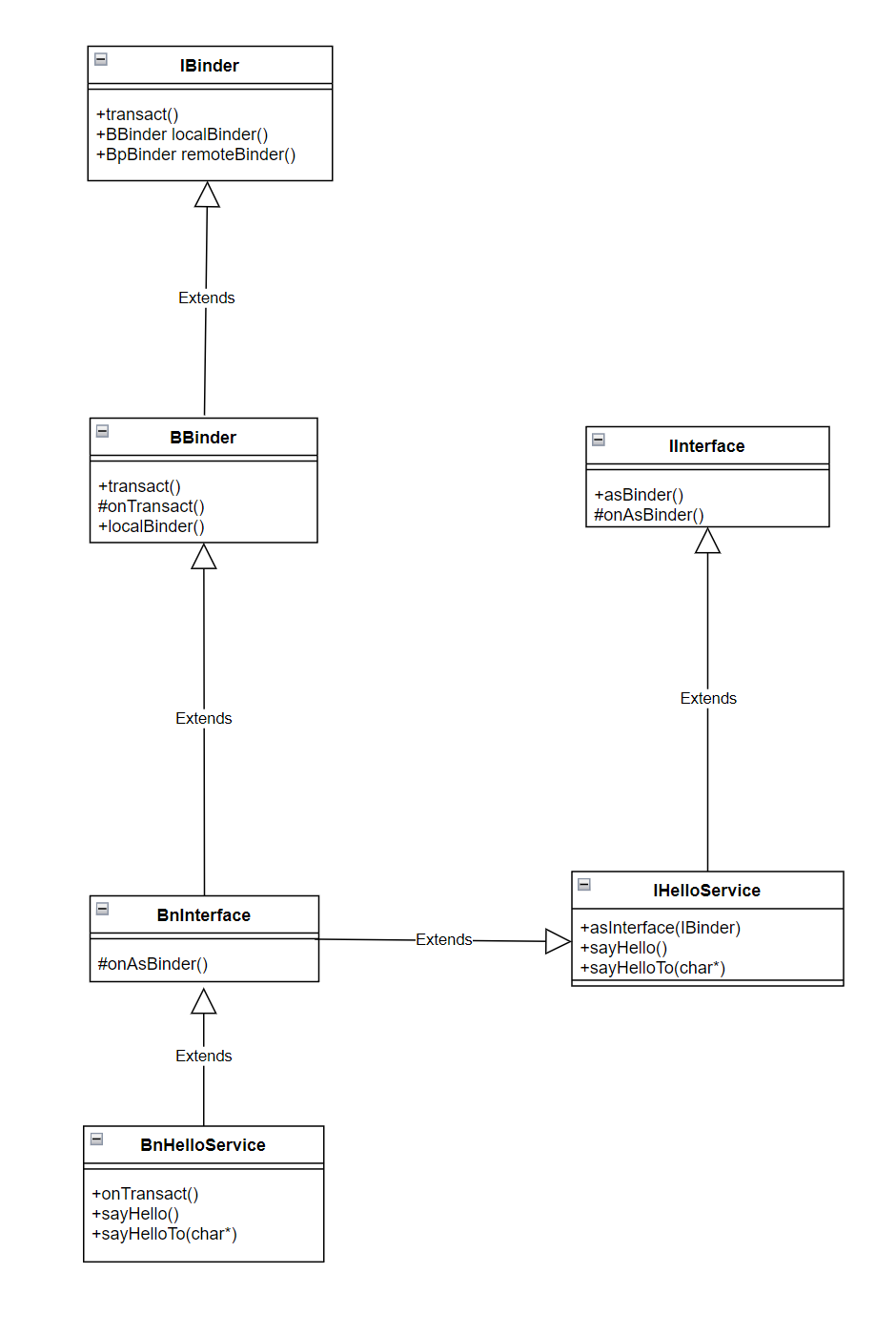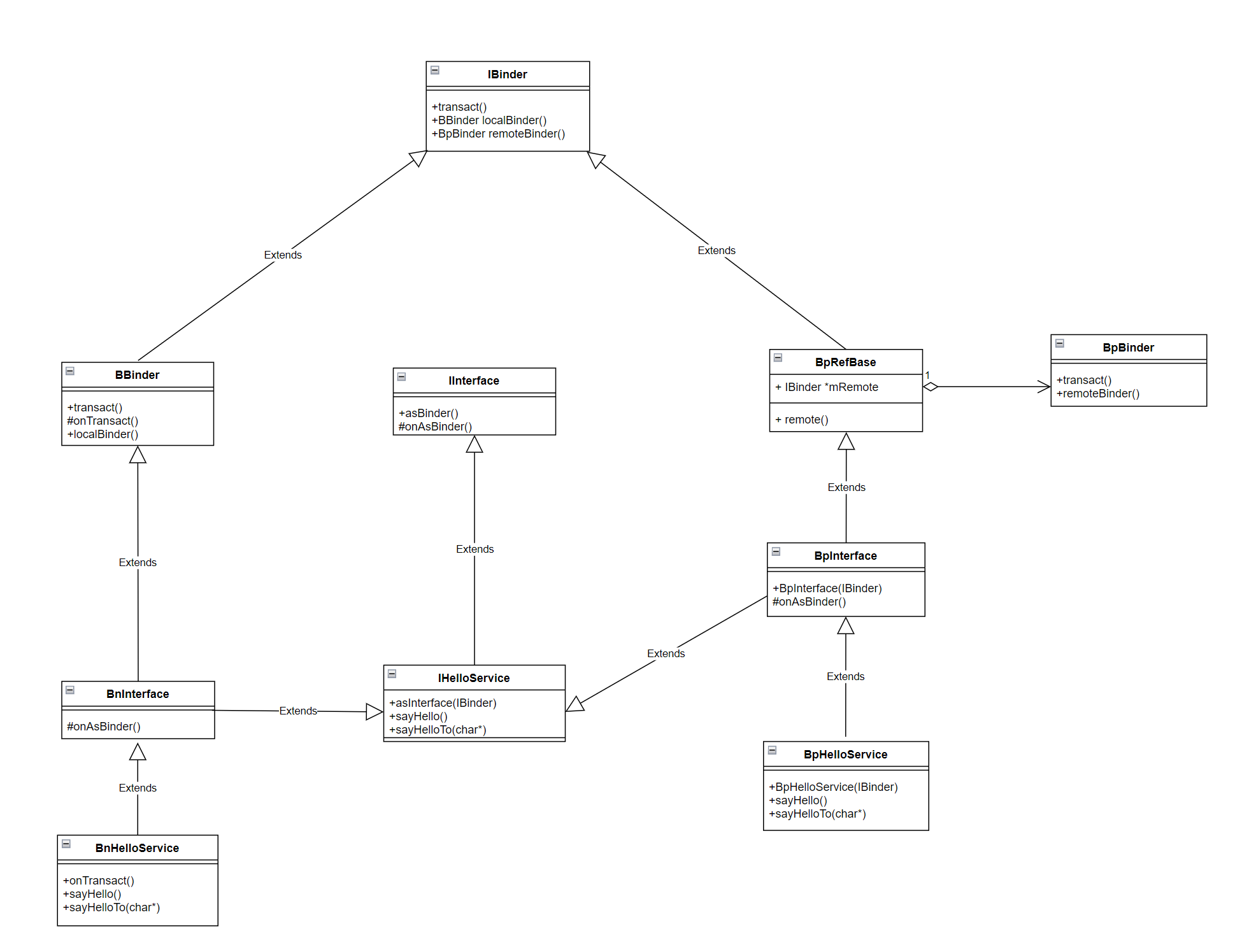本文基于 Android10 r41 源码环境
# 1. 引子
C++ 中封装了一堆 Bn Bp 开头的类。
这些类可以分为以下几类:
- 协议类:即 Server 端提供了哪些函数供 Client 端调用。在示例程序中,协议类就是 IHelloService
- Server 端类:这些类一般 Bn 开头,意思应该是 Binder Native。包括了 BBinder,BnInterface,BnHelloService
- Client 端类:这些类一般 Bp 开头,意思应该是 Binder Proxy。包括了 BpBider,BpRefBase,BpInterface,BpHelloService
接下来,我们一一分析这一堆的类:
# 2. 协议类 IHelloService
首先我们看看协议类 IHelloService:
//IHelloService.h
class IHelloService: public IInterface {
public:
//DECLARE_META_INTERFACE 是一个宏,声明了一些变量和函数
DECLARE_META_INTERFACE(HelloService);
//Binder 服务对外提供的功能
virtual void sayHello() = 0;
virtual int sayHelloTo(const char *name) = 0;
};
2
3
4
5
6
7
8
9
10
11
IHelloService 是我们定义的服务协议类,该协议类同时描述了:
- Server 端提供了 sayHello sayHelloTo 函数供其他进程远程调用
- Client 端可以通过 sayHello sayHelloTo 发起远程调用
IHelloService 继承自 IInterface, 其实现如下:
//IInterface.h
class IInterface : public virtual RefBase
{
public:
IInterface();
static sp<IBinder> asBinder(const IInterface*);
static sp<IBinder> asBinder(const sp<IInterface>&);
protected:
virtual ~IInterface();
virtual IBinder* onAsBinder() = 0;
};
//IInerface.cpp
// static
sp<IBinder> IInterface::asBinder(const IInterface* iface)
{
if (iface == nullptr) return nullptr;
return const_cast<IInterface*>(iface)->onAsBinder();
}
// static
sp<IBinder> IInterface::asBinder(const sp<IInterface>& iface)
{
if (iface == nullptr) return nullptr;
return iface->onAsBinder();
}
2
3
4
5
6
7
8
9
10
11
12
13
14
15
16
17
18
19
20
21
22
23
24
25
26
27
28
IInterface 接口中最重要的方法是 asBinder,用于将一个服务接口转化为 IBinder。在 asBinder 中会调用 onAsBinder 来完成具体的转换,onAsBinder 是一个虚函数,由子类实现。至于怎么转和为什么转,我们后面遇到再说。
IHelloService 的定义中我们使用了一个宏 DECLARE_META_INTERFACE ,其定义如下:
#define DECLARE_META_INTERFACE(INTERFACE) \
public: \
static const ::android::String16 descriptor; \
static ::android::sp<I##INTERFACE> asInterface( \
const ::android::sp<::android::IBinder>& obj); \
virtual const ::android::String16& getInterfaceDescriptor() const; \
I##INTERFACE(); \
virtual ~I##INTERFACE(); \
static bool setDefaultImpl(std::unique_ptr<I##INTERFACE> impl); \
static const std::unique_ptr<I##INTERFACE>& getDefaultImpl(); \
private: \
static std::unique_ptr<I##INTERFACE> default_impl; \
public:
2
3
4
5
6
7
8
9
10
11
12
13
将宏展开后,IHelloService 定义如下:
class IHelloService: public IInterface {
public:
static const ::android::String16 descriptor;
static ::android::sp<IHelloService> asInterface(const ::android::sp<::android::IBinder>& obj);
virtual const ::android::String16& getInterfaceDescriptor() const;
IHelloService();
virtual ~IHelloService();
static bool setDefaultImpl(std::unique_ptr<IHelloService> impl);
static const std::unique_ptr<IHelloService>& getDefaultImpl();
private:
static std::unique_ptr<IHelloService> default_impl;
public:
//Binder 服务对外提供的功能
virtual void sayHello() = 0;
virtual int sayHelloTo(const char *name) = 0;
};
2
3
4
5
6
7
8
9
10
11
12
13
14
15
16
展开的宏中,最重要的函数是 asInterface,用于将一个 IBinder 对象转换为 IHelloService 对象。至于怎么转和为什么转,我们后面遇到再说。
对应的类图如下:

# 3. Server 端相关类
Server 端对协议类 IHelloService 实现为 BnHelloService:
//声明
//IHelloService.h
class BnHelloService: public BnInterface<IHelloService> {
public:
//服务端收到数据时,会回调该函数
status_t onTransact(uint32_t code, const Parcel& data, Parcel* reply, uint32_t flags = 0);
void sayHello();
int sayHelloTo(const char *name);
};
//实现
//BnHelloService.cpp
#define LOG_TAG "HelloService"
#include <log/log.h>
#include "IHelloService.h"
namespace android {
//服务端收到数据的回调
status_t BnHelloService::onTransact(uint32_t code, const Parcel& data, Parcel* reply, uint32_t flags) {
//code 表示客户端需要调用哪个函数
switch(code) {
//调用 sayhello
case HELLO_SVR_CMD_SAYHELLO: {
//调用 sayhello 函数
sayHello();
//写入回复给客户端的数据
reply->writeInt32(0);
return NO_ERROR;
} break;
//调用 sayhelloto
case HELLO_SVR_CMD_SAYHELLO_TO: {
//取出客户端发送的参数
int32_t policy = data.readInt32();
String16 name16_tmp = data.readString16();
String16 name16 = data.readString16();
String8 name8(name16);
//调用 sayHelloTo 函数
int cnt = sayHelloTo(name8.string());
//写入回复给客户端的数据
reply->writeInt32(0);
reply->writeInt32(cnt);
return NO_ERROR;
} break;
default:
return BBinder::onTransact(code, data, reply, flags);
}
}
//服务端函数的具体实现
//这里只是简单的打一些 log
void BnHelloService::sayHello() {
static int count = 0;
ALOGI("say hello :%d\n ", ++count);
}
int BnHelloService::sayHelloTo(const char *name) {
static int cnt = 0;
ALOGI("say hello to %s : %d\n", name, ++cnt);
return cnt;
}
}
2
3
4
5
6
7
8
9
10
11
12
13
14
15
16
17
18
19
20
21
22
23
24
25
26
27
28
29
30
31
32
33
34
35
36
37
38
39
40
41
42
43
44
45
46
47
48
49
50
51
52
53
54
55
56
57
58
59
60
61
62
63
64
65
66
67
68
69
服务端的实现继承自 BnInterface
BnInterface 定义如下:
template<typename INTERFACE>
class BnInterface : public INTERFACE, public BBinder
{
public:
virtual sp<IInterface> queryLocalInterface(const String16& _descriptor);
virtual const String16& getInterfaceDescriptor() const;
protected:
typedef INTERFACE BaseInterface;
virtual IBinder* onAsBinder();
};
2
3
4
5
6
7
8
9
10
11
泛型展开后如下:
template<typename IHelloService>
class BnInterface : public IHelloService, public BBinder
{
public:
virtual sp<IInterface> queryLocalInterface(const String16& _descriptor);
virtual const String16& getInterfaceDescriptor() const;
protected:
typedef INTERFACE BaseInterface;
virtual IBinder* onAsBinder();
};
2
3
4
5
6
7
8
9
10
11
可以看出 BnInterface 继承自 IHelloService 和 BBinder,
BBinder 更准确的名字应该是 BnBinder,其具体实现如下:
class BBinder : public IBinder
{
public:
BBinder();
virtual const String16& getInterfaceDescriptor() const;
virtual bool isBinderAlive() const;
virtual status_t pingBinder();
virtual status_t dump(int fd, const Vector<String16>& args);
// NOLINTNEXTLINE(google-default-arguments)
virtual status_t transact( uint32_t code,
const Parcel& data,
Parcel* reply,
uint32_t flags = 0);
// NOLINTNEXTLINE(google-default-arguments)
virtual status_t linkToDeath(const sp<DeathRecipient>& recipient,
void* cookie = nullptr,
uint32_t flags = 0);
// NOLINTNEXTLINE(google-default-arguments)
virtual status_t unlinkToDeath( const wp<DeathRecipient>& recipient,
void* cookie = nullptr,
uint32_t flags = 0,
wp<DeathRecipient>* outRecipient = nullptr);
virtual void attachObject( const void* objectID,
void* object,
void* cleanupCookie,
object_cleanup_func func);
virtual void* findObject(const void* objectID) const;
virtual void detachObject(const void* objectID);
virtual BBinder* localBinder();
bool isRequestingSid();
// This must be called before the object is sent to another process. Not thread safe.
void setRequestingSid(bool requestSid);
protected:
virtual ~BBinder();
// NOLINTNEXTLINE(google-default-arguments)
virtual status_t onTransact( uint32_t code,
const Parcel& data,
Parcel* reply,
uint32_t flags = 0);
private:
BBinder(const BBinder& o);
BBinder& operator=(const BBinder& o);
class Extras;
Extras* getOrCreateExtras();
std::atomic<Extras*> mExtras;
void* mReserved0;
};
2
3
4
5
6
7
8
9
10
11
12
13
14
15
16
17
18
19
20
21
22
23
24
25
26
27
28
29
30
31
32
33
34
35
36
37
38
39
40
41
42
43
44
45
46
47
48
49
50
51
52
53
54
55
56
57
58
59
60
其中最重要的方法是 onTransact,作为在收到远程调用后的回调,我们在子类 BnHelloService 中完成了具体的实现。
BBinder 类继承自 IBinder,IBinder 是 Binder 相关操作的抽象,其实现如下:
class [[clang::lto_visibility_public]] IBinder : public virtual RefBase
{
public:
enum {
FIRST_CALL_TRANSACTION = 0x00000001,
LAST_CALL_TRANSACTION = 0x00ffffff,
PING_TRANSACTION = B_PACK_CHARS('_','P','N','G'),
DUMP_TRANSACTION = B_PACK_CHARS('_','D','M','P'),
SHELL_COMMAND_TRANSACTION = B_PACK_CHARS('_','C','M','D'),
INTERFACE_TRANSACTION = B_PACK_CHARS('_', 'N', 'T', 'F'),
SYSPROPS_TRANSACTION = B_PACK_CHARS('_', 'S', 'P', 'R'),
// Corresponds to TF_ONE_WAY -- an asynchronous call.
FLAG_ONEWAY = 0x00000001
};
IBinder();
/**
* Check if this IBinder implements the interface named by
* @a descriptor. If it does, the base pointer to it is returned,
* which you can safely static_cast<> to the concrete C++ interface.
*/
virtual sp<IInterface> queryLocalInterface(const String16& descriptor);
/**
* Return the canonical name of the interface provided by this IBinder
* object.
*/
virtual const String16& getInterfaceDescriptor() const = 0;
virtual bool isBinderAlive() const = 0;
virtual status_t pingBinder() = 0;
virtual status_t dump(int fd, const Vector<String16>& args) = 0;
static status_t shellCommand(const sp<IBinder>& target, int in, int out, int err,
Vector<String16>& args, const sp<IShellCallback>& callback,
const sp<IResultReceiver>& resultReceiver);
// NOLINTNEXTLINE(google-default-arguments)
virtual status_t transact( uint32_t code,
const Parcel& data,
Parcel* reply,
uint32_t flags = 0) = 0;
// DeathRecipient is pure abstract, there is no virtual method
// implementation to put in a translation unit in order to silence the
// weak vtables warning.
#if defined(__clang__)
#pragma clang diagnostic push
#pragma clang diagnostic ignored "-Wweak-vtables"
#endif
class DeathRecipient : public virtual RefBase
{
public:
virtual void binderDied(const wp<IBinder>& who) = 0;
};
#if defined(__clang__)
#pragma clang diagnostic pop
#endif
/**
* Register the @a recipient for a notification if this binder
* goes away. If this binder object unexpectedly goes away
* (typically because its hosting process has been killed),
* then DeathRecipient::binderDied() will be called with a reference
* to this.
*
* The @a cookie is optional -- if non-NULL, it should be a
* memory address that you own (that is, you know it is unique).
*
* @note You will only receive death notifications for remote binders,
* as local binders by definition can't die without you dying as well.
* Trying to use this function on a local binder will result in an
* INVALID_OPERATION code being returned and nothing happening.
*
* @note This link always holds a weak reference to its recipient.
*
* @note You will only receive a weak reference to the dead
* binder. You should not try to promote this to a strong reference.
* (Nor should you need to, as there is nothing useful you can
* directly do with it now that it has passed on.)
*/
// NOLINTNEXTLINE(google-default-arguments)
virtual status_t linkToDeath(const sp<DeathRecipient>& recipient,
void* cookie = nullptr,
uint32_t flags = 0) = 0;
/**
* Remove a previously registered death notification.
* The @a recipient will no longer be called if this object
* dies. The @a cookie is optional. If non-NULL, you can
* supply a NULL @a recipient, and the recipient previously
* added with that cookie will be unlinked.
*
* If the binder is dead, this will return DEAD_OBJECT. Deleting
* the object will also unlink all death recipients.
*/
// NOLINTNEXTLINE(google-default-arguments)
virtual status_t unlinkToDeath( const wp<DeathRecipient>& recipient,
void* cookie = nullptr,
uint32_t flags = 0,
wp<DeathRecipient>* outRecipient = nullptr) = 0;
virtual bool checkSubclass(const void* subclassID) const;
typedef void (*object_cleanup_func)(const void* id, void* obj, void* cleanupCookie);
/**
* This object is attached for the lifetime of this binder object. When
* this binder object is destructed, the cleanup function of all attached
* objects are invoked with their respective objectID, object, and
* cleanupCookie. Access to these APIs can be made from multiple threads,
* but calls from different threads are allowed to be interleaved.
*/
virtual void attachObject( const void* objectID,
void* object,
void* cleanupCookie,
object_cleanup_func func) = 0;
/**
* Returns object attached with attachObject.
*/
virtual void* findObject(const void* objectID) const = 0;
/**
* WARNING: this API does not call the cleanup function for legacy reasons.
* It also does not return void* for legacy reasons. If you need to detach
* an object and destroy it, there are two options:
* - if you can, don't call detachObject and instead wait for the destructor
* to clean it up.
* - manually retrieve and destruct the object (if multiple of your threads
* are accessing these APIs, you must guarantee that attachObject isn't
* called after findObject and before detachObject is called).
*/
virtual void detachObject(const void* objectID) = 0;
virtual BBinder* localBinder();
virtual BpBinder* remoteBinder();
protected:
virtual ~IBinder();
private:
};
2
3
4
5
6
7
8
9
10
11
12
13
14
15
16
17
18
19
20
21
22
23
24
25
26
27
28
29
30
31
32
33
34
35
36
37
38
39
40
41
42
43
44
45
46
47
48
49
50
51
52
53
54
55
56
57
58
59
60
61
62
63
64
65
66
67
68
69
70
71
72
73
74
75
76
77
78
79
80
81
82
83
84
85
86
87
88
89
90
91
92
93
94
95
96
97
98
99
100
101
102
103
104
105
106
107
108
109
110
111
112
113
114
115
116
117
118
119
120
121
122
123
124
125
126
127
128
129
130
131
132
133
134
135
136
137
138
139
140
141
142
143
144
145
Server 端的类图总结如下:

# 4. Client 端相关类
Client 端对协议类 IHelloService 实现为 BpHelloService:
//客户端
//IHelloService.h
class BpHelloService: public BpInterface<IHelloService> {
public:
BpHelloService(const sp<IBinder>& impl);
void sayHello();
int sayHelloTo(const char *name);
};
//BpHelloService.cpp
#include "IHelloService.h"
namespace android {
BpHelloService::BpHelloService(const sp<IBinder>& impl):BpInterface<IHelloService>(impl) {
}
//包装数据,并发起远程调用
void BpHelloService::sayHello() {
Parcel data, reply;
data.writeInt32(0);
data.writeString16(String16("IHelloService"));
//发起远程调用
remote()->transact(HELLO_SVR_CMD_SAYHELLO, data, &reply);
}
//包装数据,并发起远程调用
int BpHelloService::sayHelloTo(const char *name) {
Parcel data, reply;
int exception;
data.writeInt32(0);
data.writeString16(String16("IHelloService"));
data.writeString16(String16(name));
//发起远程调用
remote()->transact(HELLO_SVR_CMD_SAYHELLO_TO, data, &reply);
exception = reply.readInt32();
if (exception)
return -1;
else
return reply.readInt32();
}
IMPLEMENT_META_INTERFACE(HelloService, "IHelloService");
}
2
3
4
5
6
7
8
9
10
11
12
13
14
15
16
17
18
19
20
21
22
23
24
25
26
27
28
29
30
31
32
33
34
35
36
37
38
39
40
41
42
43
44
45
46
47
BpHelloService 继承自 BpInterface
template<typename INTERFACE>
class BpInterface : public INTERFACE, public BpRefBase
{
public:
explicit BpInterface(const sp<IBinder>& remote);
protected:
typedef INTERFACE BaseInterface;
virtual IBinder* onAsBinder();
};
2
3
4
5
6
7
8
9
10
泛型展开后如下:
class BpInterface : public IHelloService, public BpRefBase
{
public:
explicit BpInterface(const sp<IBinder>& remote);
protected:
typedef IHelloService BaseInterface;
virtual IBinder* onAsBinder();
};
2
3
4
5
6
7
8
BpInterface 继承自 IHelloService 和 BpRefBase,BpRefBase 的实现如下:
class BpRefBase : public virtual RefBase
{
protected:
explicit BpRefBase(const sp<IBinder>& o);
virtual ~BpRefBase();
virtual void onFirstRef();
virtual void onLastStrongRef(const void* id);
virtual bool onIncStrongAttempted(uint32_t flags, const void* id);
inline IBinder* remote() { return mRemote; }
inline IBinder* remote() const { return mRemote; }
private:
BpRefBase(const BpRefBase& o);
BpRefBase& operator=(const BpRefBase& o);
//核心,指向一个 BpBinder 类型
IBinder* const mRemote;
RefBase::weakref_type* mRefs;
std::atomic<int32_t> mState;
};
2
3
4
5
6
7
8
9
10
11
12
13
14
15
16
17
18
19
20
21
mRemote 实际类型是 BpBinder,BpBinder 实现如下:
class BpBinder : public IBinder
{
public:
static BpBinder* create(int32_t handle);
inline int32_t handle() const { return mHandle; }
virtual const String16& getInterfaceDescriptor() const;
virtual bool isBinderAlive() const;
virtual status_t pingBinder();
virtual status_t dump(int fd, const Vector<String16>& args);
// NOLINTNEXTLINE(google-default-arguments)
virtual status_t transact( uint32_t code,
const Parcel& data,
Parcel* reply,
uint32_t flags = 0);
// NOLINTNEXTLINE(google-default-arguments)
virtual status_t linkToDeath(const sp<DeathRecipient>& recipient,
void* cookie = nullptr,
uint32_t flags = 0);
// NOLINTNEXTLINE(google-default-arguments)
virtual status_t unlinkToDeath( const wp<DeathRecipient>& recipient,
void* cookie = nullptr,
uint32_t flags = 0,
wp<DeathRecipient>* outRecipient = nullptr);
virtual void attachObject( const void* objectID,
void* object,
void* cleanupCookie,
object_cleanup_func func);
virtual void* findObject(const void* objectID) const;
virtual void detachObject(const void* objectID);
virtual BpBinder* remoteBinder();
status_t setConstantData(const void* data, size_t size);
void sendObituary();
static uint32_t getBinderProxyCount(uint32_t uid);
static void getCountByUid(Vector<uint32_t>& uids, Vector<uint32_t>& counts);
static void enableCountByUid();
static void disableCountByUid();
static void setCountByUidEnabled(bool enable);
static void setLimitCallback(binder_proxy_limit_callback cb);
static void setBinderProxyCountWatermarks(int high, int low);
class ObjectManager
{
public:
ObjectManager();
~ObjectManager();
void attach( const void* objectID,
void* object,
void* cleanupCookie,
IBinder::object_cleanup_func func);
void* find(const void* objectID) const;
void detach(const void* objectID);
void kill();
private:
ObjectManager(const ObjectManager&);
ObjectManager& operator=(const ObjectManager&);
struct entry_t
{
void* object;
void* cleanupCookie;
IBinder::object_cleanup_func func;
};
KeyedVector<const void*, entry_t> mObjects;
};
protected:
BpBinder(int32_t handle,int32_t trackedUid);
virtual ~BpBinder();
virtual void onFirstRef();
virtual void onLastStrongRef(const void* id);
virtual bool onIncStrongAttempted(uint32_t flags, const void* id);
private:
const int32_t mHandle;
struct Obituary {
wp<DeathRecipient> recipient;
void* cookie;
uint32_t flags;
};
void reportOneDeath(const Obituary& obit);
bool isDescriptorCached() const;
mutable Mutex mLock;
volatile int32_t mAlive;
volatile int32_t mObitsSent;
Vector<Obituary>* mObituaries;
ObjectManager mObjects;
Parcel* mConstantData;
mutable String16 mDescriptorCache;
int32_t mTrackedUid;
static Mutex sTrackingLock;
static std::unordered_map<int32_t,uint32_t> sTrackingMap;
static int sNumTrackedUids;
static std::atomic_bool sCountByUidEnabled;
static binder_proxy_limit_callback sLimitCallback;
static uint32_t sBinderProxyCountHighWatermark;
static uint32_t sBinderProxyCountLowWatermark;
static bool sBinderProxyThrottleCreate;
};
2
3
4
5
6
7
8
9
10
11
12
13
14
15
16
17
18
19
20
21
22
23
24
25
26
27
28
29
30
31
32
33
34
35
36
37
38
39
40
41
42
43
44
45
46
47
48
49
50
51
52
53
54
55
56
57
58
59
60
61
62
63
64
65
66
67
68
69
70
71
72
73
74
75
76
77
78
79
80
81
82
83
84
85
86
87
88
89
90
91
92
93
94
95
96
97
98
99
100
101
102
103
104
105
106
107
108
109
110
111
112
113
114
115
类图总结如下:
